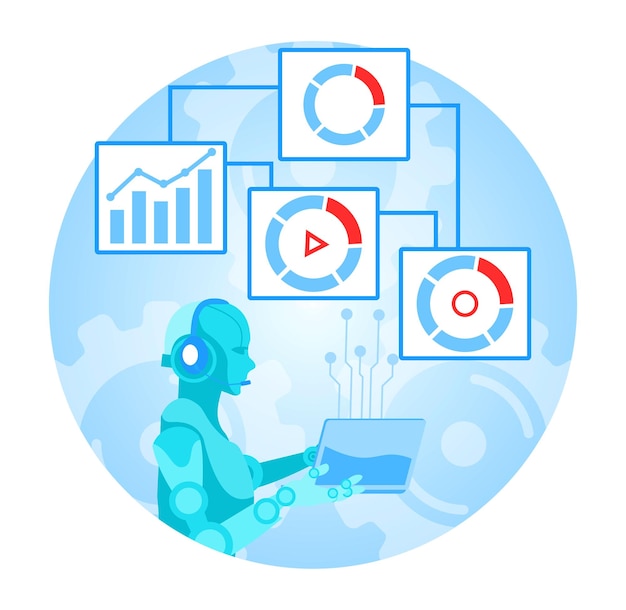AI Personalization: Transforming US Consumer Experiences

The Rise of AI-Powered Personalization is revolutionizing consumer experiences in the US by leveraging data and algorithms to deliver customized content, offers, and interactions, enhancing engagement and satisfaction.
Artificial intelligence (AI) is no longer a futuristic concept; it’s actively reshaping how businesses interact with consumers in the US. The rise of AI-powered personalization is at the forefront of this transformation, offering unprecedented opportunities to tailor experiences and build stronger customer relationships.
Understanding AI-Powered Personalization
AI-powered personalization goes beyond simple demographic targeting or basic product recommendations. It leverages advanced algorithms and machine learning to analyze vast amounts of data, predict individual preferences, and deliver truly customized experiences.
What is AI Personalization?
At its core, AI personalization uses data to understand individual customer needs and preferences. This data might include browsing history, purchase patterns, demographic information, and even social media activity.
How Does it Work?
AI algorithms analyze this data to identify patterns and predict future behavior. This allows businesses to personalize everything from website content and product recommendations to marketing emails and customer service interactions.
- Data Collection: Gathering information from various sources.
- Algorithm Analysis: Using AI to identify patterns and preferences.
- Personalized Delivery: Tailoring experiences based on individual insights.
AI-powered personalization aims to create a more relevant and engaging experience for each customer, leading to increased satisfaction and loyalty.

Benefits of AI Personalization for Businesses
Implementing AI personalization can yield significant benefits for businesses operating in the US market, ranging from increased sales and customer loyalty to improved operational efficiency.
Enhanced Customer Engagement
Personalized experiences are inherently more engaging. When customers feel understood and valued, they’re more likely to spend time on a website, interact with marketing materials, and ultimately make a purchase.
Increased Conversion Rates
By delivering tailored offers and recommendations, AI personalization can significantly increase conversion rates. Customers are more likely to buy when they see products and services that align with their specific needs and interests.
- Higher Click-Through Rates: Personalized emails and ads are more likely to be clicked.
- Improved Sales: Targeted offers lead to increased purchase rates.
- Stronger Customer Loyalty: Personalized experiences foster loyalty and repeat business.
AI-powered personalization not only enhances customer experiences but significantly contributes to the bottom line by driving sales and fostering long-term customer relationships.
AI Personalization in E-commerce
The e-commerce industry has been quick to adopt AI personalization, leveraging its capabilities to create more engaging and profitable online shopping experiences. This includes optimizing product recommendations and enhancing the entire path to purchase.
Personalized Product Recommendations
AI algorithms can analyze a shopper’s browsing history, past purchases, and demographic data to suggest products they’re likely to be interested in. These recommendations can be displayed on product pages, in shopping carts, and in marketing emails.
Dynamic Pricing and Promotions
AI can also be used to dynamically adjust pricing and promotions based on individual customer behavior and market conditions. This allows retailers to optimize pricing for maximum profitability while still offering competitive deals.
E-commerce businesses are using AI personalization to create a more tailored and relevant shopping experience. Customers find exactly what they need with greater ease, leading to increased conversions and customer lifetime value.
AI Personalization in Marketing
Marketing professionals are increasingly turning to AI personalization to deliver more effective and targeted campaigns across various channels. AI is adept at optimizing both ad campaigns and email marketing strategies.
Personalized Ad Campaigns
AI-powered advertising platforms can analyze user data to create highly targeted ad campaigns. This ensures that ads are only shown to people who are likely to be interested in the product or service being advertised, maximizing ad spend and ROI.
Personalized Email Marketing
AI can be used to personalize email marketing campaigns in a variety of ways, from tailoring the subject line and content to sending emails at the optimal time of day. This results in higher open rates, click-through rates, and conversion rates.
- Dynamic Content: Emails adjust content based on user data.
- Behavioral Triggers: Emails sent based on specific actions.
- Predictive Analysis: Customizing email offers using AI forecasts.
AI personalization in marketing offers significant efficiency improvements and higher campaign effectiveness while creating more personalized and engaging interactions with customers.

Challenges and Considerations
While AI personalization offers many benefits, it also presents several challenges and considerations that businesses need to address to ensure responsible and effective implementation of this technology. These include data privacy and ethical concerns.
Data Privacy Concerns
Collecting and using customer data for personalization raises important data privacy concerns. Businesses need to be transparent about how they’re collecting and using data, and they need to comply with all relevant privacy regulations.
Ethical Considerations
AI personalization can also raise ethical concerns, such as the potential for bias in algorithms and the risk of manipulating consumers. Companies need to be aware of these risks and take steps to mitigate them.
Addressing data privacy and ethical challenges is critical when leveraging AI personalization. This enables consumer trust and secures compliance as it continues to rise.
The Future of AI Personalization
The future of AI personalization is likely to be even more sophisticated and integrated into every aspect of the customer experience. Advancements in AI technology, such as natural language processing and computer vision, are paving the way for even more personalized and immersive experiences.
Hyper-Personalization
In the future, AI personalization will move beyond basic demographic and behavioral data to incorporate real-time context, such as location, weather, and even emotional state. This will enable businesses to deliver truly hyper-personalized experiences that are tailored to the individual’s specific needs and circumstances at any given moment.
AI-Powered Customer Service
AI is also being used to enhance customer service by providing personalized support and assistance. AI-powered chatbots can answer customer questions, resolve issues, and even provide proactive recommendations based on individual customer needs.
Ultimately, the future of AI personalization is about creating a more seamless, intuitive, and human-centered experience for every customer.
| Key Aspect | Brief Description |
|---|---|
| ⚙️ How AI Works | AI analyzes data to predict preferences and personalize experiences. |
| 📈 Business Benefits | Improved engagement, higher conversion rates, and increased loyalty. |
| 🛒 E-commerce Use | Personalized recommendations and dynamic pricing strategies. |
| 🛡️ Privacy Issues | Requires transparency and compliance with data regulations. |
FAQ
▼
AI-powered personalization utilizes artificial intelligence to analyze data and customize experiences for consumers in the US, creating tailored interactions and offerings.
▼
By analyzing customer data and behavior, AI personalization delivers more relevant and engaging experiences, resulting in increased satisfaction and loyalty.
▼
Benefits include increased sales, improved customer retention, and more effective marketing campaigns through tailored content and offers.
▼
Ethical considerations include data privacy, potential biases in algorithms, and the need for transparency in how data is collected and used to avoid manipulation.
▼
The future of AI personalization will likely involve hyper-personalization, and AI-powered service that is much more integrated into every aspect of the customer experience and their buying cycle.
Conclusion
As we’ve explored, the rise of AI-powered personalization is significantly impacting consumer experiences across the US. Businesses that embrace this technology responsibly and ethically can unlock tremendous opportunities to build stronger customer relationships, drive sales, and achieve sustainable growth.
